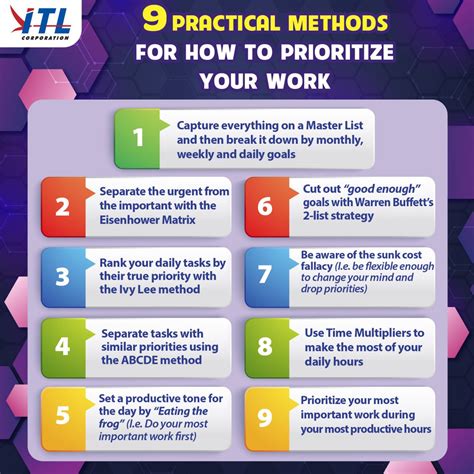In today's fast-paced academic environment, it's essential for students to optimize their time and find effective ways to balance their studies, responsibilities, and personal lives. By implementing smart scheduling techniques, you can make the most of your limited time and achieve better academic results without feeling overwhelmed.
A key aspect of successful time management is prioritization. By identifying your most important tasks and allocating sufficient time to them, you can ensure that you are investing your efforts where they matter the most. This involves setting clear goals and breaking them down into smaller, manageable tasks. By using a systematic approach, you can stay focused and diligent, ensuring that every task you undertake contributes to your overall success.
Additionally, it is crucial to develop effective planning skills. Planning allows you to create a roadmap for your academic journey and ensures that you are always aware of upcoming deadlines and commitments. By using a digital or physical planner, you can schedule your study sessions, assignments, and extracurricular activities in advance, enabling you to better organize your time and avoid last-minute rushes. Remember, failing to plan is planning to fail. So, take the time to plan your schedule and stick to it as much as possible.
Prioritize Your Tasks and Develop a Schedule

When it comes to efficiently managing your time as a student, one crucial aspect is prioritizing your tasks and creating a well-structured schedule. By recognizing the urgency and importance of your assignments, projects, and other commitments, you can ensure that you allocate your time and energy effectively.
Start by evaluating your tasks and responsibilities, and determine which ones require immediate attention and which ones can be handled later. This process involves categorizing your tasks based on their urgency, significance, and deadlines. By doing so, you can gain clarity on which tasks to tackle first and which ones can be deferred, allowing you to work efficiently and avoid unnecessary stress.
After prioritizing your tasks, the next step is to develop a schedule that will guide your daily activities and help you stay on track. Creating a detailed plan of how you will utilize your time enables you to allocate specific time slots for each task. It is essential to be realistic and allow buffer time for unexpected events or challenges that may arise.
Consider incorporating various techniques that suit your preferences and learning style, such as time blocking, where you assign specific time periods for different activities. Additionally, you may opt to use productivity tools or digital calendars to help you stay organized and provide reminders.
Remember to review and adjust your schedule as needed. As priorities change or new tasks arise, it is essential to reassess and make necessary modifications to ensure that your time is consistently managed effectively.
Breaking down tasks into smaller, more manageable portions
Mastering the art of efficiently utilizing your time as a student involves the ability to effectively divide tasks into smaller, more feasible components. By dividing your tasks into manageable chunks, you can easily prioritize and complete them in a more organized and efficient manner. This approach helps to alleviate feelings of overwhelm and encourages a more focused and productive work ethic.
To begin, start by making a comprehensive list of all the tasks that need to be completed, using specific and action-oriented language. By breaking down larger tasks into smaller, more specific subtasks, you can create a roadmap that makes it easier to understand and tackle the work at hand.
- Identify the key steps or milestones required to accomplish each task.
- Allocate realistic timeframes for each subtask, taking into consideration your available time and priorities.
- Consider any dependencies or prerequisites for certain tasks, ensuring that you are allocating sufficient time and resources.
- Once you have created your list, prioritize the tasks based on their importance and deadline.
Remember, breaking tasks into smaller chunks not only makes them more manageable, but also allows for a sense of accomplishment as you complete each subtask. This method helps to maintain motivation and build momentum as you work through your to-do list.
Additionally, consider using techniques such as the Pomodoro Technique, where you work in short bursts of focused concentration, followed by short breaks. This approach helps to prevent burnout and keep your mind fresh when dealing with larger, more challenging tasks.
By incorporating the practice of breaking tasks into smaller, manageable chunks into your time management routine, you can enhance your productivity as a student and ultimately achieve your academic goals more effectively.
Eliminating Distractions and Cultivating a Focused Study Environment

In order to optimize your productivity and concentration while studying, it is crucial to minimize disruptions and create a conducive environment for focused learning. By eliminating distractions and cultivating a dedicated study space, you can enhance your ability to absorb, retain, and apply the information effectively.
First and foremost, it is essential to identify and remove distractions that may hinder your concentration. These distractions can include noisy environments, interruptions from friends or family members, electronic devices, and other temptations that divert your attention away from studying. By finding a quiet and tranquil space where you can study without interruptions, you can immerse yourself fully in the learning process without any external disturbances.
In addition to reducing external distractions, it is equally important to minimize internal distractions. This involves managing your internal thoughts and emotions that can pull your focus away from studying. Procrastination, worry, stress, and lack of motivation are common internal distractions that can negatively impact your ability to concentrate. To overcome these distractions, it can be helpful to establish a routine, set achievable goals, break down tasks into smaller, manageable parts, and practice positive self-talk to stay motivated and focused.
Cultivating a focused study environment also involves organizing your study materials and creating an uncluttered workspace. Having a tidy and well-organized study area can help alleviate visual distractions and provide a sense of calmness and clarity. Arrange your textbooks, notebooks, and other resources in an orderly manner, keeping them within reach but without causing clutter. Utilize organizers, folders, or digital tools to categorize and store your study materials for easy access and efficient workflow.
Furthermore, consider the impact of your physical surroundings on your ability to concentrate. Ensure that your study space is well-lit with appropriate lighting that does not strain your eyes. Ergonomic furniture, such as a comfortable chair and desk, can enhance your posture and contribute to a more comfortable and efficient studying experience. By creating a pleasant and inviting study environment, you can promote productivity and focus.
In conclusion, eliminating distractions and creating a focused study environment is essential for effective time management and academic success. Minimizing both external and internal distractions, organizing study materials, and optimizing your physical surroundings are key strategies to cultivate an environment that fosters concentration, productivity, and efficient learning.
Harness the Power of Technology and Time-Saving Tools
In today's fast-paced world, it is essential for students to optimize their time effectively. Embracing technology and utilizing time-saving tools can be a game-changer in achieving this goal. By leveraging innovative solutions, students can streamline their tasks, increase productivity, and free up valuable time for other important activities. Let's explore some beneficial ways to harness the power of technology and time-saving tools.
- 1. Digital calendars and scheduling apps:
- 2. Productivity and task management apps:
- 3. Online collaboration and communication tools:
- 4. Digital note-taking and organization:
- 5. Online learning platforms and resources:
Efficiently managing your schedule is crucial for effective time management. Utilize digital calendars and scheduling apps to track deadlines, class schedules, and extracurricular activities. These tools provide reminders, notifications, and the ability to sync across multiple devices, helping you stay organized and never miss an important deadline or appointment.
Make the most of productivity and task management apps that offer features like to-do lists, priority setting, and progress tracking. These tools help you break down your tasks into smaller, manageable chunks, set deadlines, and monitor your progress. By visualizing and prioritizing your tasks, you can tackle them systematically and efficiently.
Collaborating with classmates for group projects or seeking assistance from professors is easier than ever with online collaboration and communication tools. Platforms like Google Drive, Microsoft Teams, or Slack enable seamless file sharing, real-time collaboration, and effective communication, eliminating the need for physical meetings and enhancing productivity.
Replace traditional pen and paper with digital note-taking tools to streamline your study materials and stay organized. Applications like Evernote or OneNote allow you to create, store, and organize notes, web clippings, and research materials in one place. With the ability to search, tag, and access your notes from any device, you can save time searching for information and have everything at your fingertips.
Take advantage of online learning platforms and resources to enhance your productivity and expand your knowledge. Accessing e-books, video lectures, interactive quizzes, and practice materials online saves time compared to traditional methods. These platforms also often offer personalized learning experiences and progress tracking, enabling you to learn at your own pace and focus on areas you need improvement in.
By incorporating these technology-driven solutions and time-saving tools into your daily routine, you can optimize your time management as a student. Embrace the convenience, efficiency, and productivity that technology offers, allowing you to achieve academic success while enjoying a well-balanced student life.
Take Regular Breaks for Enhanced Productivity

Optimizing your study sessions by incorporating regular breaks can lead to heightened productivity and improved learning outcomes. By interspersing focused study periods with short periods of rest, you can effectively maintain your concentration, enhance your cognitive abilities, and avoid mental fatigue.
Breaking up your study time allows your brain to recharge and process the information you have absorbed, making it easier for you to retain and recall knowledge. These planned breaks provide an opportunity to relax, allowing your mind to consolidate information and make connections between concepts, ultimately aiding in better understanding and retention.
Not only do regular breaks improve your concentration and focus, but they also provide a chance to physically rejuvenate. Taking short breaks to stretch, move around, or engage in light physical activity can help alleviate muscle tension and reduce the risk of sitting-related health issues. By engaging in brief exercise or relaxation techniques during these breaks, you can refresh both your mind and body, improving your overall well-being.
It is important to note that the key to effective breaks lies in their structure and duration. Ideally, breaks should be taken every hour or two, lasting around 10-15 minutes each. During this time, it is advisable to engage in activities unrelated to your studies, such as going for a short walk, listening to music, or practicing deep breathing exercises. Avoid activities that can distract you for extended periods, as they may hinder your ability to refocus on your tasks.
In conclusion, incorporating regular breaks into your study routine can significantly enhance your productivity, concentration, and overall academic performance. By strategically planning and utilizing these brief periods of rest, you can optimize your learning experience, combat mental fatigue, and accomplish more in less time.
Learn the Art of Declining and Preventing Overcommitment
In the pursuit of effective time management as students, it becomes crucial to master the skill of saying no and avoiding excessive commitments. Learning to set boundaries and prioritize tasks allows for better focus, increased productivity, and reduced stress levels. Succumbing to the pressure of taking on too many responsibilities can hinder academic performance and personal well-being.
Here are some strategies to help you learn to say no and avoid overcommitting:
- Evaluate your priorities: Before committing to any new task or request, assess its alignment with your personal and academic goals. Determine the importance and urgency of each commitment to make informed decisions on where to invest your time and energy.
- Set realistic boundaries: Establish clear boundaries regarding how much you are willing and able to take on. Communicate these boundaries assertively and respectfully to others, ensuring they understand your limitations and respect your choices.
- Practice effective communication: Develop the skill of expressing your limitations and declining requests politely yet firmly. Use phrases such as "I would love to help, but I currently have prior commitments" or "Unfortunately, I won't be able to take on any additional tasks at the moment."
- Be aware of your limitations: Recognize your own capabilities and limits. Be honest with yourself about how much you can handle without compromising the quality of your work or your well-being. Accepting more than you can handle may lead to burnout and decreased productivity.
- Learn to delegate: Don't be afraid to share responsibilities and delegate tasks when possible. Effective delegation can help distribute the workload evenly and prevent overcommitment. This skill not only lightens your load but also fosters collaboration and teamwork.
- Create a schedule: Utilize time management tools like calendars or planners to organize your commitments and prioritize tasks. Having a visual representation of your schedule allows you to assess your availability before committing to additional responsibilities.
- Practice self-care: Remember to prioritize self-care activities like relaxation, exercise, and socializing. Taking care of your physical and mental well-being is essential for maintaining a healthy balance and preventing overcommitment.
By mastering the art of saying no and avoiding overcommitment, you can create a more balanced and productive student life. Cultivating these strategies will enable you to focus on the tasks that truly matter and allocate your time wisely, resulting in enhanced academic performance and overall well-being.
Set Goals and Track Your Progress

Setting goals and monitoring your progress is a vital aspect of optimizing your time and achieving success in your academic pursuits. By establishing clear objectives, you can effectively prioritize your tasks and stay focused on what truly matters.
Start by identifying specific aims or targets that you want to accomplish within a specified period. Break them down into manageable tasks, each with its own deadline, and assign them priority levels based on their importance and urgency.
Emphasize the significance of setting realistic goals. It is crucial to set objectives that are attainable given your available time and resources. Unrealistic goals can lead to frustration and a feeling of being overwhelmed. By setting feasible targets, you can maintain motivation and enjoy a sense of accomplishment as you achieve each milestone.
Track your progress regularly to ensure you are on the right path. This can be done by measuring your achievements against your predetermined goals and deadlines. You can use tools such as calendars, to-do lists, or online platforms specifically designed for tracking progress. Regularly reviewing your progress will help you identify any necessary adjustments and keep you motivated to stay on track.
Remember to celebrate your achievements along the way. Recognizing and rewarding your progress will provide a sense of satisfaction and motivate you to continue striving towards your ultimate goals.
Establish a Consistent Schedule and Maintain It
Creating a regular routine and adhering to it consistently is a fundamental aspect of effective time management for students. By establishing a structured schedule, you can cultivate a sense of discipline and order in your daily life without becoming overwhelmed by the numerous tasks and responsibilities that come with being a student. A consistent routine allows you to allocate dedicated time for studying, attending classes, completing assignments, and engaging in extracurricular activities.
Consistency is key when it comes to time management. By following a set schedule, you will be able to develop good habits and avoid the pitfalls of procrastination and disorganization. Having a predetermined framework will enable you to prioritize your commitments, stay focused, and accomplish your tasks efficiently.
Regularizing your daily activities not only helps you identify your prime productivity hours but also enables you to allocate time for relaxation and rest. By consistently following a routine, you can strike a balance between work and leisure, ensuring that you are not overwhelmed or burnt out by a demanding schedule.
Furthermore, sticking to a routine can help in creating momentum. Once you establish a pattern of regularity, it becomes easier to stay motivated and maintain your productivity levels. This sense of continuity can reduce stress, as it provides a sense of stability and predictability in your academic journey.
Most importantly, establishing and maintaining a consistent schedule requires discipline and commitment. It may be challenging initially, but with determination and self-control, you can develop a routine that suits your unique needs and preferences. Remember to be flexible when necessary, but always endeavor to maintain the core structure of your schedule.
In summary, by establishing a consistent routine and sticking to it, you can effectively manage your time as a student, prioritize your responsibilities, and create a sense of balance in your life. Consistency, regularity, and discipline are the pillars of successful time management, leading to increased productivity, reduced stress levels, and overall academic success.
Practice self-care and maintain a harmonious work-life equilibrium

In the pursuit of academic excellence, it can be easy for students to become consumed by their studies and sacrifice their well-being. However, prioritizing self-care and maintaining a healthy work-life balance is crucial for long-term success and overall happiness. This section aims to explore various strategies and approaches that students can employ to take care of themselves while managing their academic responsibilities.
Recognize the significance of self-care: In order to thrive both academically and personally, it is essential for students to acknowledge the importance of self-care. By dedicating time to activities that promote relaxation, rejuvenation, and personal fulfillment, students can recharge their energy and enhance their overall well-being.
Establish boundaries and set realistic goals: Setting clear boundaries is crucial for balancing academic commitments and personal life. By establishing limits for study time, relaxation, and leisure activities, students can better manage their time and avoid overwhelming themselves. Additionally, setting realistic goals for both academics and personal interests allows students to maintain a sense of accomplishment and satisfaction.
Embrace effective stress-management techniques: Stress is an inevitable part of student life, but it is crucial to manage it effectively to maintain a healthy work-life balance. Students can explore various stress-management techniques such as meditation, exercise, keeping a journal, or participating in hobbies that help them relax and release tension. By incorporating these activities into their routine, students can alleviate stress and promote a more balanced and fulfilling lifestyle.
Seek support and maintain social connections: Building a strong support system can greatly contribute to a student's well-being and success. Engaging with friends, family members, peers, and mentors provides a valuable outlet for emotional support, advice, and shared experiences. Maintaining social connections not only enhances overall happiness but also offers different perspectives and insights, helping students to prioritize their needs and achieve a healthier work-life balance.
Practice time management and prioritize tasks: Effective time management is essential for maintaining a healthy work-life balance. By creating schedules, breaking down tasks into manageable parts, and prioritizing activities, students can allocate time efficiently to their academic responsibilities and personal interests. This approach helps in avoiding procrastination, reducing stress levels, and ensuring that all aspects of life receive the attention they deserve.
By practicing self-care and maintaining a healthy work-life balance, students can foster their personal growth, improve their overall well-being, and achieve long-term success. Prioritizing self-care is not only essential for students' academic journey but also an investment in their future well-being and happiness.
FAQ
How can I effectively manage my time as a student?
Effective time management as a student can be achieved through various strategies. Firstly, create a schedule or a to-do list to prioritize your tasks. Set specific goals and allocate time slots to complete each task. Secondly, eliminate distractions such as social media or excessive use of your smartphone. Instead, focus on your studies and limit your leisure activities to designated breaks. Thirdly, break down large tasks into smaller, more manageable chunks, allowing you to work on them consistently. Lastly, make sure to take short breaks during study sessions to avoid mental fatigue and maintain productivity.
Why is time management important for students?
Time management is crucial for students because it helps them stay organized, reduces stress levels, and improves productivity. By effectively managing their time, students can complete assignments and study for exams without feeling overwhelmed. It also allows them to have a healthy work-life balance, as they can allocate time for both academic and personal activities. Moreover, good time management skills foster discipline and self-control, which are important qualities for success in both academic and professional life.
What are some common time-wasting activities that students should avoid?
Students often engage in time-wasting activities that hinder their productivity. These include excessive use of social media platforms, aimless browsing on the internet, watching TV shows or movies for extended periods, and spending too much time chatting with friends online. These activities can consume a significant amount of time that could be better utilized for studying or completing assignments. It is important for students to be mindful of such distractions and limit their time spent on these activities to improve their time management skills.
Can you provide some tips for overcoming procrastination and managing time effectively?
Absolutely! Overcoming procrastination and managing time effectively can be challenging but not impossible. Firstly, break down tasks into smaller, more manageable parts, which can make them appear less overwhelming and increase motivation. Secondly, set deadlines for each task or assignment to create a sense of urgency. Thirdly, find a study environment that minimizes distractions and promotes focus. Additionally, reward yourself after completing tasks or reaching milestones to stay motivated. Finally, create a study routine and stick to it, as consistency is key to effective time management.



